Key takeaways:
- Reproductive justice includes not only the right to make choices about one’s body but also the necessary resources and support, particularly for marginalized communities.
- Pro-life advocacy emphasizes the importance of supporting families, not just opposing abortion, and requires addressing broader social challenges like economic instability and access to healthcare.
- Implementing reproductive justice policies faces obstacles such as political resistance, financial constraints, and public misinformation about reproductive rights.
- The future of reproductive justice may benefit from integrating grassroots solutions and encouraging collaboration between policymakers and community advocates.
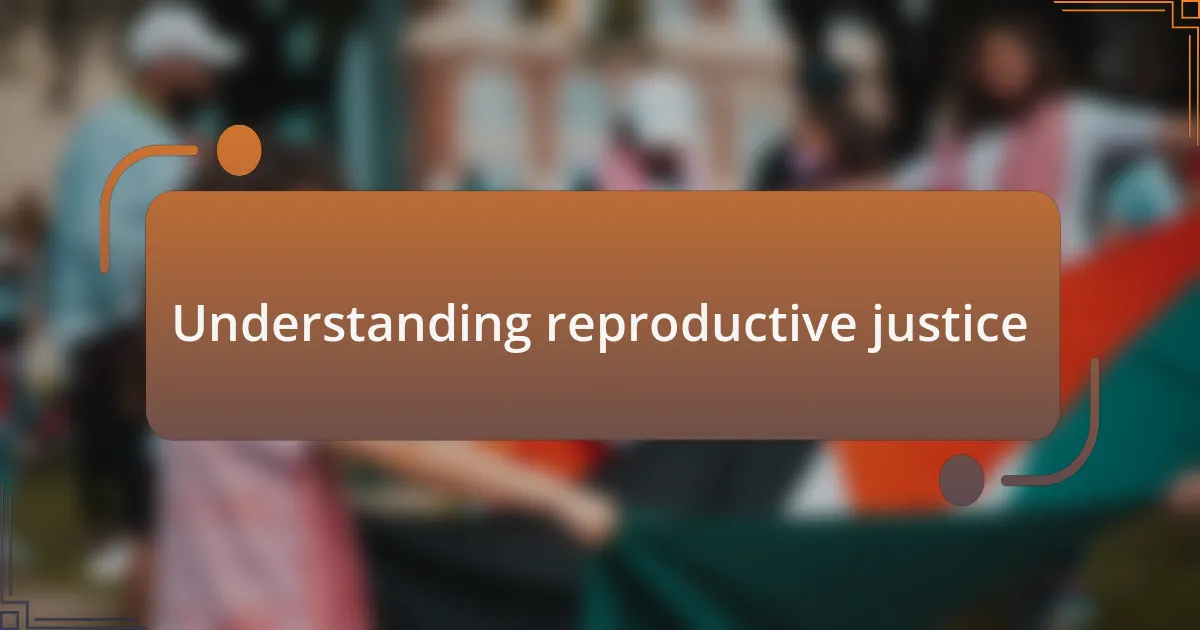
Understanding reproductive justice
Reproductive justice goes beyond the simple notion of pro-choice or pro-life. It encompasses the idea that every individual deserves not only the right to make choices about their own bodies but also the support and resources necessary to make those choices meaningful. I often wonder how different our conversations would be if we focused on the underlying systemic issues affecting these choices—like poverty, healthcare access, and education.
For me, understanding reproductive justice means acknowledging that marginalized communities often face greater barriers in accessing reproductive healthcare. I remember a friend who struggled to navigate these barriers, facing disbelief from healthcare providers simply because of her background. This experience illuminated the harsh realities many face, leading me to question: how can we claim to uphold justice when so many are left voiceless in their reproductive decisions?
Additionally, it’s crucial to recognize that reproductive justice is not just about legal rights; it’s about the social conditions that enable or restrict those rights. I often reflect on how societal norms shape our perceptions. When will we start to see reproductive justice as a holistic approach that includes advocacy for economic stability, education, and healthcare equity? These are the conversations we need to have, as they impact real lives and futures.
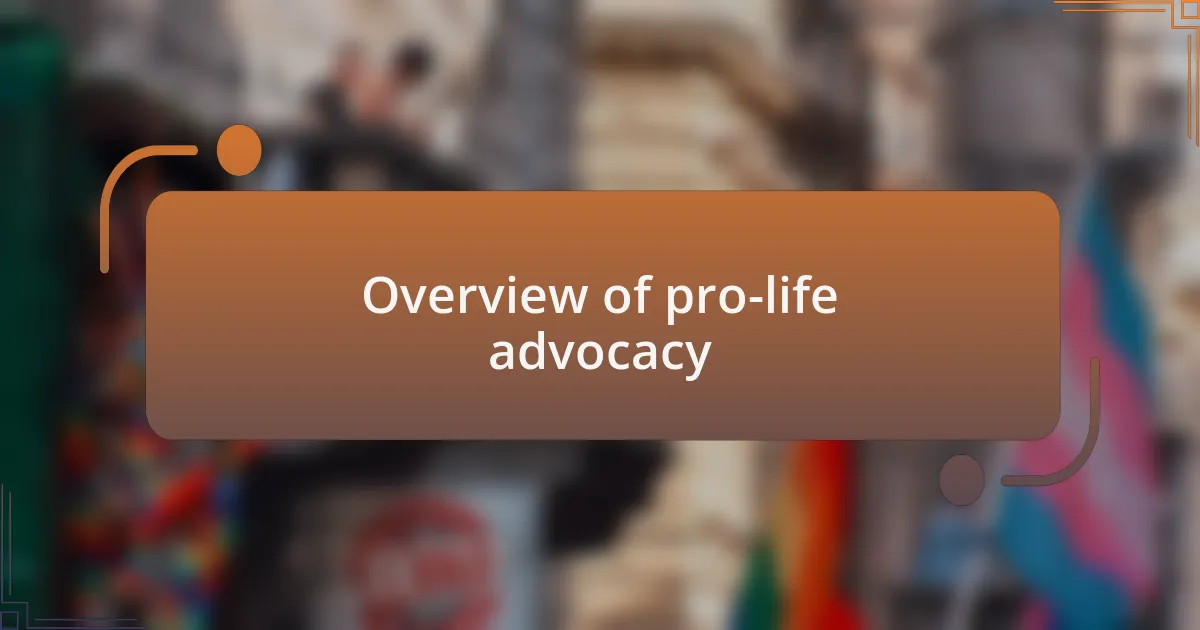
Overview of pro-life advocacy
Pro-life advocacy is fundamentally rooted in the belief that every human life, from conception to natural death, possesses inherent dignity and value. This perspective emphasizes the importance of protecting the unborn and ensuring that they have the opportunity to flourish. I often find myself reflecting on the stories of mothers who chose life against all odds, revealing the power of hope and resilience in their journeys.
At times, I feel that conversations around pro-life advocacy can become polarized, overshadowing the nuances of the issue. There is a compelling need to foster understanding and compassion among differing viewpoints. I’ve seen firsthand how personal narratives change lives; a friend’s decision to carry an unplanned pregnancy to term not only transformed her life but also created a profound sense of community support that resonated far beyond her immediate circle.
Moreover, pro-life advocacy isn’t just about opposing abortion; it’s about creating a supportive environment for families. The challenges of parenting, especially in tough circumstances, resonate deeply with many. I’ve always believed that advocating for policies that provide assistance—be it through healthcare, housing, or education—truly reflects a commitment to valuing life in all its forms. How can we champion the rights of the unborn without addressing the realities that families face every day?
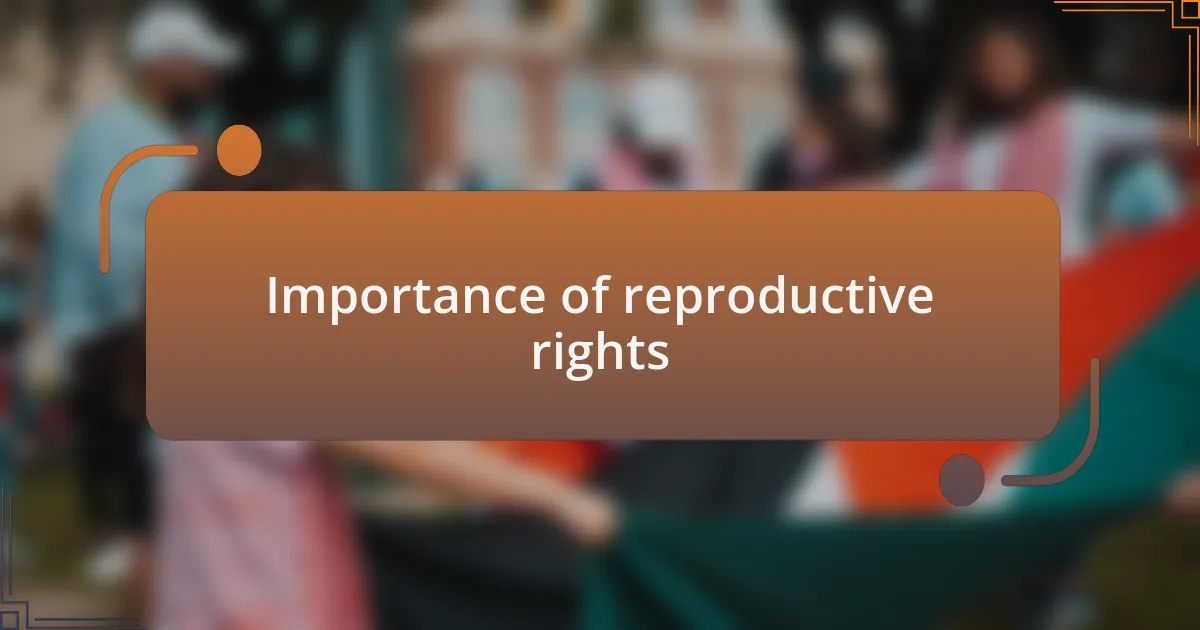
Importance of reproductive rights
Reproductive rights are essential to ensuring that individuals have the autonomy to make choices about their own bodies and futures. I recall a close friend who faced an unexpected pregnancy at a time when she was pursuing her career goals. The emphasis on her right to choose empowered her to make informed decisions and ultimately led her to a path that balanced motherhood with her ambitions. How can we advocate for life without also respecting the right of each person to determine their own path?
These rights also play a crucial role in public health, as access to comprehensive reproductive healthcare can reduce maternal mortality rates. I remember reading reports of women in underserved communities who lacked access to essential services. The tragic outcomes consistently highlighted the disparity and need for policies that prioritize reproductive rights. Isn’t it our responsibility to support a framework that not only values unborn life but also protects the lives of mothers?
Moreover, reproductive rights can impact socioeconomic conditions. I once volunteered at a center that offered resources and counseling to young mothers, which profoundly opened my eyes to the challenges they faced. Many were caught in cycles of poverty that could have been addressed through better reproductive care and education. Shouldn’t we strive for a society where every individual can thrive, armed with the knowledge and support they need to make the best decisions for their circumstances?
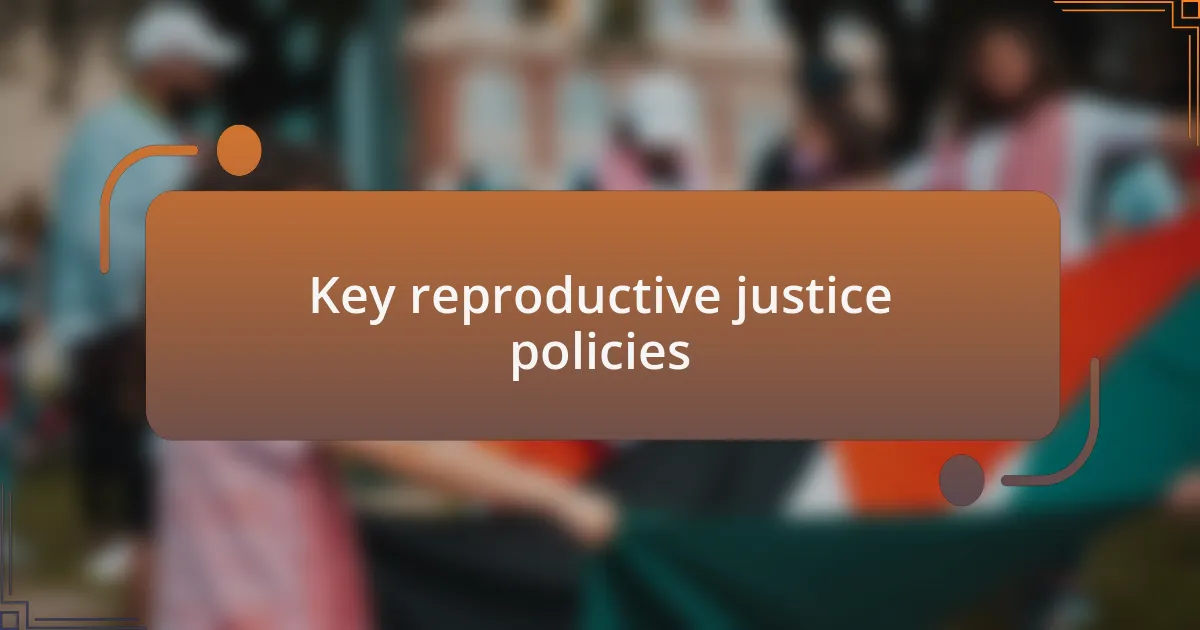
Key reproductive justice policies
Key reproductive justice policies encompass a variety of initiatives designed to ensure equitable access to reproductive healthcare. For example, policies mandating comprehensive sex education in schools can empower young individuals by equipping them with crucial knowledge about their bodies and their rights. I often think back to my own education, where the lack of such information left many of us feeling uninformed and vulnerable. How different might it have been if we had learned about our choices in a supportive environment?
Another important policy is the provision of affordable contraception. I’ve seen firsthand how crucial it is for people to have reliable access to birth control options that suit their needs. A friend of mine struggled with unexpected pregnancies partly due to financial barriers that restricted her choices. By advocating for policies that lower or eliminate these costs, we can open doors for many individuals to plan their futures responsibly. Isn’t the ability to choose when and if to have children a fundamental aspect of personal freedom?
Additionally, ensuring access to safe and legal abortion services is critical in the framework of reproductive justice. I recall a community event where we discussed the experiences of those who had to navigate this issue under restrictive laws. The fear and stigma surrounding these decisions were palpable. It made me wonder: how do we claim to be pro-life while denying individuals the option to make informed choices for their own health and well-being? These policies collectively affirm the right to bodily autonomy and aim to create a society where everyone can thrive.
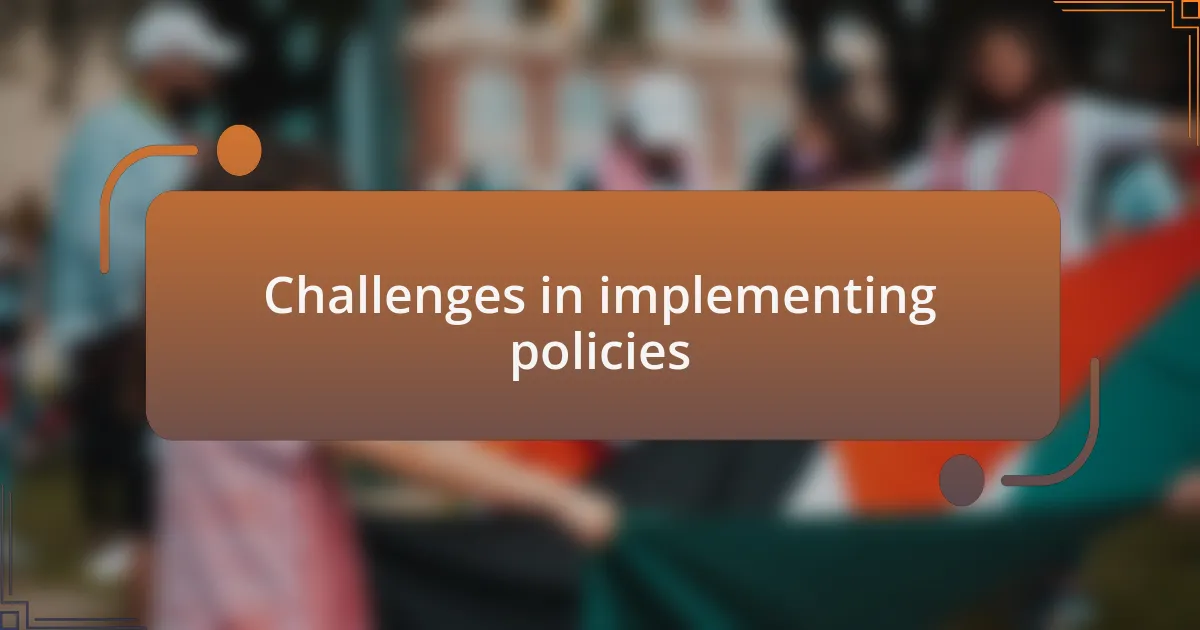
Challenges in implementing policies
Implementing reproductive justice policies often faces significant political and societal resistance. I remember attending a town hall meeting where passionate advocates laid out their plans, only to be met with opposition that echoed long-standing prejudices. It was a stark reminder of how deeply entrenched beliefs can block progress, making me question how we can bridge the gap between personal convictions and the collective good.
Financial constraints also pose a major hurdle. I have spoken to many organizations dedicated to reproductive health that struggle to secure consistent funding. The urgency of these issues often feels overshadowed by budget cuts and competing priorities. How can we push forward when essential services remain unfunded, leaving vulnerable populations without necessary support?
Moreover, public awareness and understanding of reproductive justice still have a long way to go. At a recent workshop, I noticed that many participants were misinformed about the implications of certain policies. This highlights a crucial challenge: if we aren’t all on the same page, how can we expect to create meaningful change? Ensuring everyone is informed and engaged is vital for moving forward, yet it feels like an uphill battle.
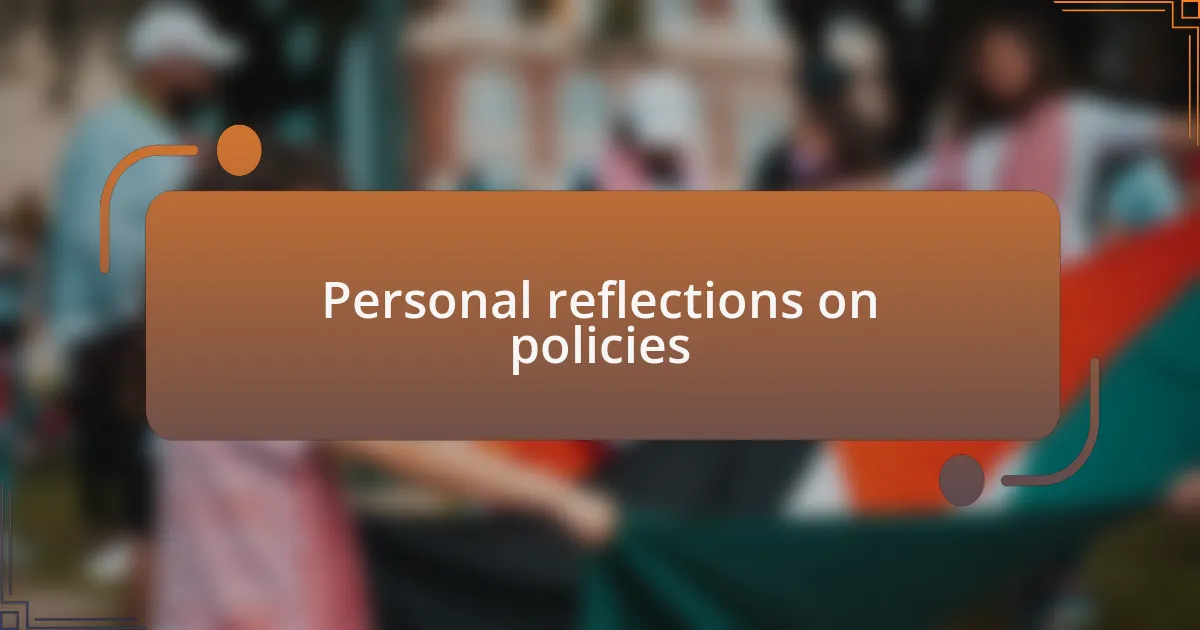
Personal reflections on policies
Reflecting on reproductive justice policies, I often feel a mix of hope and frustration. I recall sitting in a community meeting where we brainstormed ideas to promote access to reproductive health. The energy was contagious, but as I listened to stories of individuals who faced systemic barriers, it struck me how often policy discussions overlook the personal experiences at stake. How many voices go unheard in these debates?
In my experience, the conversation around these policies can feel overwhelmingly disconnected from the realities people face daily. I once spoke with a young mother who shared her struggles accessing prenatal care due to transportation limits. Her story illustrated that policies often lack the grounding in lived experiences that would make them truly effective. This makes me ponder: Are we crafting policies in a vacuum, detached from the real-world implications they have on families?
Moreover, I sometimes wonder if our advocacy focuses too much on the macro-level, while micro-level impacts are left unaddressed. There was a moment when a friend of mine, deeply passionate about this topic, pointed out the importance of centering individual narratives in our activism. It made me realize that each policy decision affects someone’s life profoundly. How can we ensure that every policy reflects the needs of those it intends to serve?
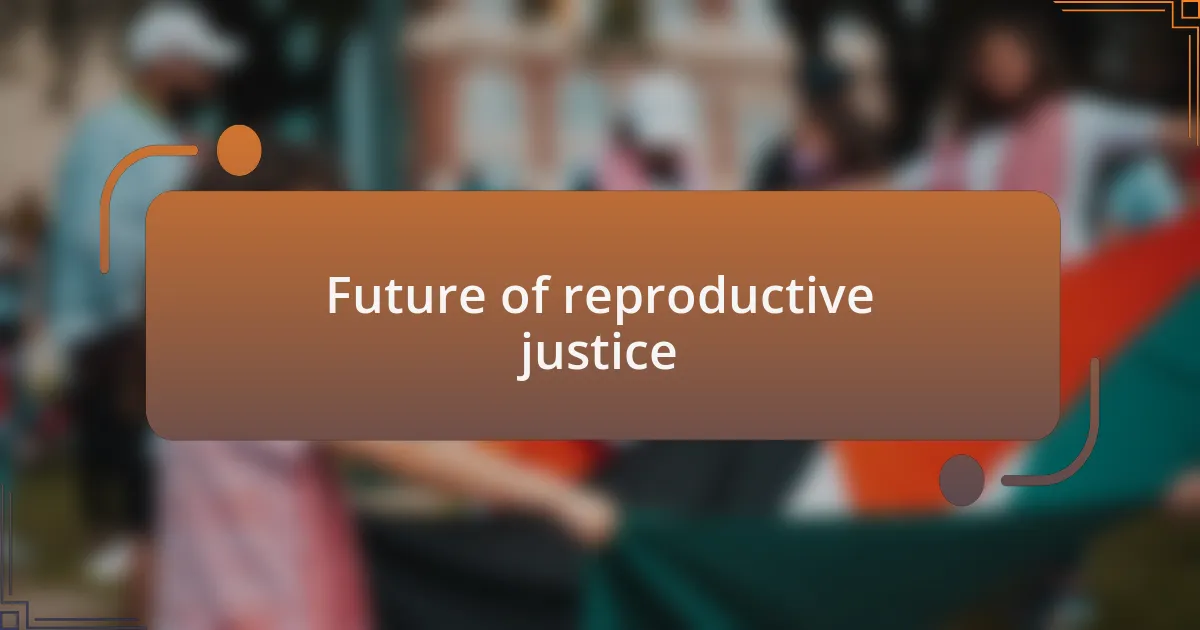
Future of reproductive justice
As I think about the future of reproductive justice, I am often reminded of the conversations I’ve had with healthcare providers frustrated by administrative hurdles. A nurse once confided in me how these barriers often delay crucial care, leaving vulnerable populations stranded. This makes me question: how can we reimagine healthcare systems to prioritize immediate access instead of navigating a maze of paperwork?
Looking ahead, I see potential in community-driven initiatives that elevate local voices. I remember attending a workshop where participants shared grassroots solutions that actually worked in their neighborhoods. Listening to these stories was inspiring and led me to wonder: what if policymakers collaborated more closely with these grassroots advocates? The fusion of professional insight and personal experience could reshape the landscape of reproductive justice effectively.
However, the challenge remains daunting. The ongoing political climate raises concerns about the sustainability of any progress. I’m left wondering how much longer advocates can fight against regressive policies that ignore the needs of the very people they aim to protect. So, I ask myself: what persisting strategies can we implement to keep the momentum of reproductive justice alive in the face of adversity?